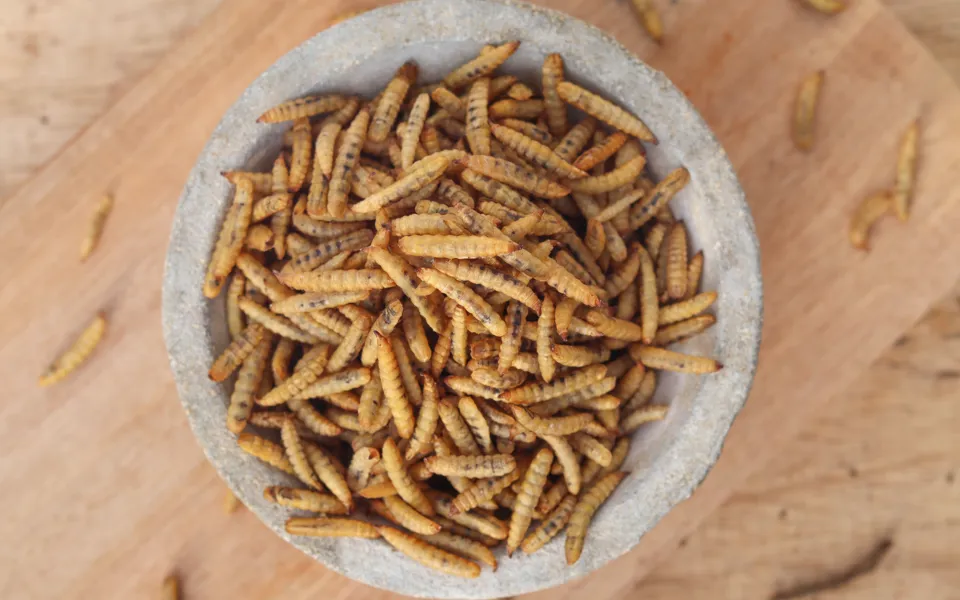
Are insects an answer to reducing emissions from meat production?
16 Apr 2025
Ricardo has produced a life cycle assessment (LCA) study of the potential environmental impacts of different animal feedstocks to help identify routes towards reducing emissions from meat production in the UK.
Up to one fifth of the world’s greenhouse gas emissions derive from meat production, the majority of which is from pig and poultry meat. With around 60% of emissions from pig and poultry meat linked to the production of animal feed, there has been much debate within the sector over the use of alternative animal feed sources with insect-based feed gaining interest as it may require less water, energy and land resource than plant-based products.
In July 2023, the UK government’s Department for Environment, Food and Rural Affairs (DEFRA) commissioned Ricardo’s sustainability team to provide an independent, scientifically robust LCA report exploring how, from an emissions reduction point of view, the production of insect protein might perform as pig and poultry feed compared to conventional soybean and fish stocks.
The research looked at the potential cradle-to-gate – ie. from raw material acquisition to manufacturing and distribution - impacts of using the larvae from Black Soldier Fly (BSFL) (Hermetia illucens) reared from both permitted sources (e.g wheat-based feed) and currently unpermitted sources (e.g food waste, chicken manure).
The associated potential impacts of the BSFL feed were assessed in terms of 16 environmental impact categories, including climate change, acidification, ecotoxicity, land, and water use. Comparative assessments were made for soybean meal grown in Brazil and transported to the UK, and fish meal made from blue whiting caught off the Scottish coast.
The (LCA study was undertaken in compliance with the two ISO standards for life cycle assessments (ISO 14040 and ISO 14044) and, in accordance with these standards, was subject to critical review by an independent panel of experts.
Study findings summary
The LCA study concluded that insect protein may not yet be the one-size-fits-all sustainable solution it is sometimes portrayed to be given that none of the feeds assessed outperformed any other across all of the 16 categories. Instead, the picture is much more complex and situation-dependent.
The study found that insect feed could offer potential to decarbonise animal feed if produced under certain appropriate conditions such as using low impact feedstocks to rear the larvae, use of clean energy during production, or by minimising energy usage.
Furthermore, the study surmised that future research investigating the potential for byproducts from BSFL such as insect oil and frass (exoskeletons, larvae castings, faeces etc.) to improve the insect feed performance would help compile a more complete understanding.
In addition to the LCA, the study investigated current research and data on the use of the BSFL frass byproduct as a fertiliser. It was concluded that:
- more standardisation on the nutrient composition will be needed to assess the usefulness of frass as a fertiliser;
- that there is no consensus on rates of application and there is a paucity of research performing field trials;
- crucially, there needs to be a thorough investigation of the impact of frass application as a fertiliser at field scales on the wider environmental impacts understanding the fate of nitrogen, its impact on soil GHG emissions and interactions with the resident soil biology.
Globally, research is being undertaken to ascertain the efficacy of insect frass as a fertiliser, but the team found that until these three research gaps have been investigated, the usefulness and safety of frass being spread in large quantities over farmland is unknown.
Further information and support
Download the report on the DEFRA website
Find out more about life cycle assessment
Get in touch with any questions or to find out how we can support you through life cycle assessment




 Ricardo Sustainability, Clean Energy and Environment
Ricardo Sustainability, Clean Energy and Environment




